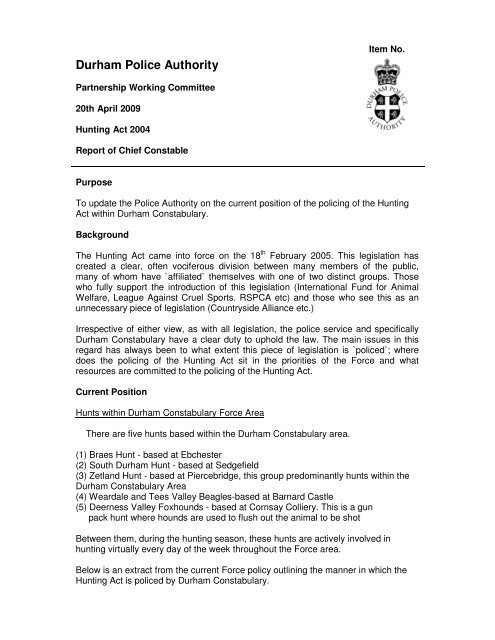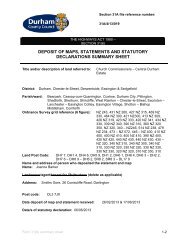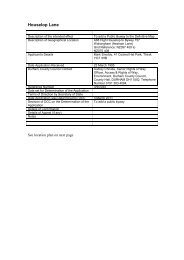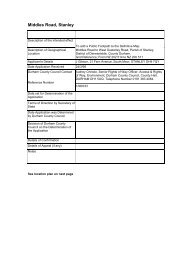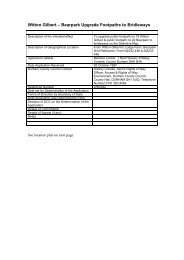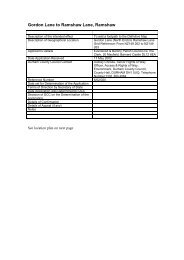PA Update re Hunting Actdoc _2_.pdf - Durham Heritage Coast
PA Update re Hunting Actdoc _2_.pdf - Durham Heritage Coast
PA Update re Hunting Actdoc _2_.pdf - Durham Heritage Coast
You also want an ePaper? Increase the reach of your titles
YUMPU automatically turns print PDFs into web optimized ePapers that Google loves.
<strong>Durham</strong> Police Authority<br />
Partnership Working Committee<br />
20th April 2009<br />
<strong>Hunting</strong> Act 2004<br />
Report of Chief Constable<br />
Purpose<br />
Item No.<br />
To update the Police Authority on the cur<strong>re</strong>nt position of the policing of the <strong>Hunting</strong><br />
Act within <strong>Durham</strong> Constabulary.<br />
Background<br />
The <strong>Hunting</strong> Act came into force on the 18 th February 2005. This legislation has<br />
c<strong>re</strong>ated a clear, often vociferous division between many members of the public,<br />
many of whom have `affiliated` themselves with one of two distinct groups. Those<br />
who fully support the introduction of this legislation (International Fund for Animal<br />
Welfa<strong>re</strong>, League Against Cruel Sports. RSPCA etc) and those who see this as an<br />
unnecessary piece of legislation (Countryside Alliance etc.)<br />
Ir<strong>re</strong>spective of either view, as with all legislation, the police service and specifically<br />
<strong>Durham</strong> Constabulary have a clear duty to uphold the law. The main issues in this<br />
<strong>re</strong>gard has always been to what extent this piece of legislation is `policed`; whe<strong>re</strong><br />
does the policing of the <strong>Hunting</strong> Act sit in the priorities of the Force and what<br />
<strong>re</strong>sources a<strong>re</strong> committed to the policing of the <strong>Hunting</strong> Act.<br />
Cur<strong>re</strong>nt Position<br />
Hunts within <strong>Durham</strong> Constabulary Force A<strong>re</strong>a<br />
The<strong>re</strong> a<strong>re</strong> five hunts based within the <strong>Durham</strong> Constabulary a<strong>re</strong>a.<br />
(1) Braes Hunt - based at Ebchester<br />
(2) South <strong>Durham</strong> Hunt - based at Sedgefield<br />
(3) Zetland Hunt - based at Piercebridge, this group p<strong>re</strong>dominantly hunts within the<br />
<strong>Durham</strong> Constabulary A<strong>re</strong>a<br />
(4) Weardale and Tees Valley Beagles-based at Barnard Castle<br />
(5) Deerness Valley Foxhounds - based at Cornsay Colliery. This is a gun<br />
pack hunt whe<strong>re</strong> hounds a<strong>re</strong> used to flush out the animal to be shot<br />
Between them, during the hunting season, these hunts a<strong>re</strong> actively involved in<br />
hunting virtually every day of the week throughout the Force a<strong>re</strong>a.<br />
Below is an extract from the cur<strong>re</strong>nt Force policy outlining the manner in which the<br />
<strong>Hunting</strong> Act is policed by <strong>Durham</strong> Constabulary.
“It has been determined by the Executive Management Group, in line with<br />
Government <strong>re</strong>commendations, that the policing of this legislation by <strong>Durham</strong><br />
Constabulary will not featu<strong>re</strong> high in the priorities of the Force and will not<br />
detract from the other Force priorities. No uniformed officer is to individually<br />
attend hunting meetings with a view to prosecuting persons taking part in<br />
such activity. Any p<strong>re</strong> planned police p<strong>re</strong>sence at a hunting meeting shall be<br />
determined by the <strong>re</strong>levant Operational Support Manager (Chief Inspector)<br />
who will ensu<strong>re</strong> that the cor<strong>re</strong>ct planning and <strong>re</strong>source allocation is committed<br />
to the event (evidence gathe<strong>re</strong>rs, PSU staff etc). If the<strong>re</strong> is a high potential for<br />
media inte<strong>re</strong>st etc the Force Executive should be apprised of the situation in<br />
the planning stage.<br />
The<strong>re</strong> will inevitably be occasions when officers a<strong>re</strong> called upon to attend hunt<br />
<strong>re</strong>lated incidents by members of the public. On such occasions, the officer should<br />
attend, and (without placing themselves in danger) obtain as much information as is<br />
possible with <strong>re</strong>gards to those persons p<strong>re</strong>sent who may be engaging in unlawful<br />
activities. This should be done in a way that takes into consideration the <strong>re</strong>levant<br />
articles of the European Convention on Human Rights, so that only those details<br />
<strong>re</strong>qui<strong>re</strong>d to p<strong>re</strong>vent crime and disorder and those proportionally <strong>re</strong>qui<strong>re</strong>d to<br />
investigate any incident should be obtained. From these personal details, those<br />
conside<strong>re</strong>d <strong>re</strong>levant to p<strong>re</strong>vent futu<strong>re</strong> crime and disorder should be ente<strong>re</strong>d on to the<br />
Force intelligence system (Memex). It is important that the Force develops an<br />
‘organisational memory’ in <strong>re</strong>lation to hunt <strong>re</strong>lated incidents. Hence any incident and<br />
any decision in <strong>re</strong>lation to it should be <strong>re</strong>corded on Memex and key worded<br />
`<strong>Hunting</strong>`. It is the <strong>re</strong>sponsibility of the <strong>re</strong>levant Neighbourhood Policing Inspectors to<br />
ensu<strong>re</strong> that this process is completed as such intelligence will inform subsequent<br />
operational decisions in <strong>re</strong>lation to policing futu<strong>re</strong> hunting events. It is the<br />
<strong>re</strong>sponsibility of the officer making any decision under this policy to ensu<strong>re</strong> that their<br />
decision and the rationale for it a<strong>re</strong> <strong>re</strong>corded on memex.<br />
Any officer being p<strong>re</strong>sented with any physical evidence by a member of the public<br />
that purports to be proof of activity that contravenes this legislation (video footage<br />
etc.) should take possession of that material in the usual manner. Any decision<br />
<strong>re</strong>garding prosecution for <strong>Hunting</strong> Act offences must be made in line with cur<strong>re</strong>nt<br />
statutory charging procedu<strong>re</strong>s.<br />
At all times officer should ensu<strong>re</strong> that their actions comply with the Police and<br />
Criminal Evidence Act 1984”.<br />
The force is now considering the <strong>re</strong>quests by the Anti Hunt Lobby to charge hunts for<br />
the cost of their policing. At this stage however, it is not conside<strong>re</strong>d that the Force<br />
will amend its cur<strong>re</strong>nt position.<br />
Additionally the Force is considering a meeting with all hunts in the close season to<br />
ensu<strong>re</strong> they understand the necessity of conforming to the law. Furthermo<strong>re</strong> it will<br />
allow hunts to give feedback to the Force along the principles of <strong>PA</strong>CT meetings. It<br />
would be the intention of the Force to invite members of the <strong>PA</strong> to that meeting.
Cur<strong>re</strong>nt Priorities<br />
Operational<br />
o Combat terrorism and protect our communities<br />
o Combat and disrupt organised crime groups<br />
o Protecting vulnerable people from the risk of serious harm<br />
o Reduce the harm to communities caused by alcohol and drugs<br />
o Make communities safer and mo<strong>re</strong> cohesive (including NHP and ASB)<br />
Conclusion<br />
As has been proved nationally, securing a conviction for illegal hunting is very hard<br />
to achieve. Given the fact that hunting p<strong>re</strong>dominantly takes place on horseback in<br />
rural locations often over distances of many miles, the obtaining of evidence to<br />
secu<strong>re</strong> a prosecution is very difficult to achieve. The <strong>re</strong>cent High Court decision that<br />
cor<strong>re</strong>ctly <strong>re</strong>inforced it was the duty of the prosecution to prove what was taking place<br />
was illegal (as in line with other criminal proceedings) as opposed to those<br />
committing alleged illegal acts to prove that what they we<strong>re</strong> doing was lawful, further<br />
st<strong>re</strong>ngthening the good sense of taking the measu<strong>re</strong>d approach outlined above.<br />
The level of policing <strong>re</strong>sources committed to policing this legislation will always be a<br />
contentious issue. By many (as borne out by the volume of cor<strong>re</strong>spondence <strong>re</strong>ceived<br />
by the Police Authority on this subject) the `intelligence led` <strong>re</strong>sponse will be viewed<br />
as not `doing enough`.<br />
Whilst much `generic` cor<strong>re</strong>spondence has been generated (post cards etc.) the<strong>re</strong><br />
still <strong>re</strong>mains very few incidents whe<strong>re</strong> `evidence based` <strong>re</strong>ports of illegal hunting<br />
activities a<strong>re</strong> <strong>re</strong>ported across the Force a<strong>re</strong>a.<br />
However, one such complaint was made in March 2008 when a case file was<br />
submitted to the CPS for prosecutorial advice. The CPS lawyer determined that No<br />
Further Action would be taken on this occasion stating “conflict of inte<strong>re</strong>sts” as the<br />
<strong>re</strong>al issue.<br />
Recommendation<br />
That the cur<strong>re</strong>nt Force Policy outlining <strong>Durham</strong> Constabulary`s policing of the<br />
<strong>Hunting</strong> Act is a measu<strong>re</strong>d, intelligence led and appropriate <strong>re</strong>sponse,<br />
commensurate with the need to ensu<strong>re</strong> that the focus of operational staff continues<br />
to be di<strong>re</strong>cted towards add<strong>re</strong>ssing the determined priorities of the Force.<br />
T.J. Stoddart<br />
Chief Constable
Appendix 1: Risks and Implications<br />
Finance The<strong>re</strong> has been minimal financial expenditu<strong>re</strong> committed to policing the<br />
<strong>Hunting</strong> Act since being introduced in 2005 and adopting an intelligence<br />
led approach. Any change to a mo<strong>re</strong> `proactive` approach may have<br />
financial implications in committing <strong>re</strong>sources to the policing of the act.<br />
Staffing Mo<strong>re</strong> proactive policing of the <strong>Hunting</strong> Act would inevitably lead to<br />
inc<strong>re</strong>ased abstraction of staff from their co<strong>re</strong> function and away from<br />
focusing on Force priorities.<br />
Equality and Diversity No impact upon Equality and Diversity legislation<br />
Accommodation N/A<br />
Crime and Disorder The<strong>re</strong> is continual potential for disorder between hunt<br />
monitors and those engaging in hunting activities. However,<br />
such a risk has been p<strong>re</strong>sent since this legislation was<br />
introduced but has not materialised. If any intelligence is<br />
<strong>re</strong>ceived as to the potential of a `large scale` protest whe<strong>re</strong><br />
it can be <strong>re</strong>asonably envisaged that disorder may take place,<br />
such an event would be policed appropriately with allocation<br />
of the cor<strong>re</strong>ct level of <strong>re</strong>sources to p<strong>re</strong>vent disorder.<br />
Human Rights No impact upon HR Issues<br />
Child<strong>re</strong>n's Act 2004 N/A<br />
Stakeholder/Community Engagement Established dialogue between all<br />
parties concerned should continue.<br />
`Complaints` or `issues` raised should<br />
be dealt with on an individual basis.<br />
Cor<strong>re</strong>spondence <strong>re</strong>ceived detailing<br />
`specific` incidents occurring within the<br />
Force a<strong>re</strong>a should be dealt with on a<br />
personal basis. `Generic` cor<strong>re</strong>spondence<br />
<strong>re</strong>ceived (post cards etc) should <strong>re</strong>ceive<br />
a `generic` <strong>re</strong>sponse.<br />
Environment None specific to <strong>Durham</strong> Constabulary although whole issue<br />
<strong>re</strong>volves around environmental concerns.<br />
Collaboration Potential for routine (non intelligence led) policing of hunting<br />
activities being undertaken on a `<strong>re</strong>gional` basis if desi<strong>re</strong>d.<br />
Other risks None evident.<br />
Contact Officer: Ken Cook<br />
Job Title: Inspector Operational Support Department.<br />
Telephone: 0191-3752054<br />
Email: Ken.cook@durham.pnn.police.uk


